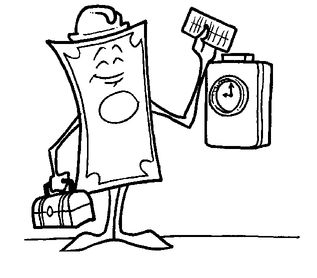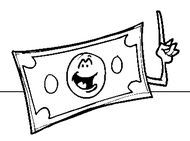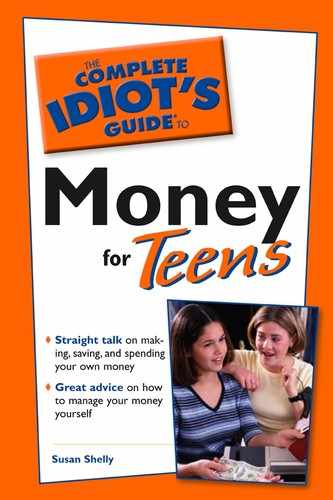
Chapter 9
Making Your Money Work for You
In This Chapter
✧ Knowing the best ways to save your money
✧ Opening a savings account
✧ Looking at different kinds of financial institutions
✧ The difference between simple and compound interest
✧ Other ways to save your money
Most people agree that having money is a good thing. You’ve already learned how money not only enables you to get stuff you need or want, but also gives you options and choices and allows you a level of independence that you wouldn’t have without it.
What many people might not realize is that having money is just one part of the equation. Knowing how to make the money you have work for you is nearly as important as having it at all. In this chapter, you learn about smart ways to save the money you have and how to get the most back from your money that you can.
Some Ways of Saving Are Better Than Others
How do you save your money? Maybe you have a bank account or you keep your cash in a box on your dresser. Some people just carry all the money they have around with them so that it’s readily available when they see something they want to buy. Others give their money to their parents to keep so they won’t be tempted to spend it.
There are a lot of ways to save money, but some make a lot more sense than others. If you have $200 and you keep it in a box on your dresser, you’ll have $200 until you spend it, somebody in your family borrows it, or your dog eats it. If you have $200 and you put it in an interest-bearing savings account, you’ll earn money on your money.
Putting your money someplace where it earns interest is smarter than keeping it in a box on your dresser, under your mattress, or on the top shelf of your closet.

Imagine That
Banks used to pay 5 percent interest on all savings accounts because it was a federal regulation. Unfortunately, along came banking deregulation in 1986, and interest rates have never been the same.
Opening a Savings Account
So, you want to open a savings account? Good! You’re definitely on the right track. Before you walk down to the corner bank and hand over all your money, though, let’s consider some things you should know about banks and the accounts and services they offer.
Choosing a Bank
Commercial banks have changed tremendously in the past couple of decades. We’ve seen one bank after another merge with a larger one, change its name, and open under new management, only to merge again a short time later and start the cycle over again. It’s a full-time job just keeping up with the names of some of these banks, much less their policies and the people who work in them. It hasn’t always been that way with banks.

Money Matters
There are somewhere around 13,000 different commercial banks operating in America today. This is down from about 31,000 during America’s banking heyday in the 1920s.
Picture this, if you can: Once upon a time—not all that long ago—people kept their money in small banks in their neighborhoods or towns. They’d go to their banks often, and they were acquainted with the people who worked there. They knew the names of the people who waited on them and the employees knew their names, too. They’d ask about each other’s children or discuss the weather. There were no ATM machines in this once-upon-a-time bank land, so customers visited their banks often to make deposits or withdrawals.
It’s a lot harder these days to find personal service and customer loyalty in banking, so you might have to look around for a while until you find an institution you like. Mega-mergers, increasingly complicated regulations, and more and more bank fees have discouraged many a person looking for the right bank. (Did you know that some banks actually charge customers to make a face-to-face transaction with a teller?)
You’re likely to use the same bank your parents do when opening a savings or other type of account, and that’s fine. If your parents are happy with their bank, it’s probably a good institution. Just so you know, though, there are some questions you should ask when you’re trying to choose a bank:
✧ Must I have a minimum amount with which to open an account?
✧ Will I be charged a monthly fee if I don’t maintain a certain balance in my account?
✧ Does the bank charge a fee for me to get my account balances or for other services?
✧ Will I be penalized if I don’t keep my money in the account for a certain amount of time?
✧ Is my account federally insured?
✧ How much interest will I earn on my savings?
✧ How is the interest compounded? (More about that later in the chapter.)
It’s smart to compare banks if you’re choosing one on your own. You can check out their ads in the newspaper, get information from their Web sites, or even stop by and look them over personally. Don’t be discouraged if you have to look at a few different banks before you find one you like. Remember that just because you’re young doesn’t mean that your savings account isn’t important. In fact, a smart bank will go out of its way to attract and keep young investors. After all, you’ve got loads of potential for earning down the road, and you might someday be one of the bank’s most important customers.
Or, Maybe Not a Bank
Commercial banks, although the biggest segment of the U.S. banking system, aren’t the only game in town. Generally, there are three types of financial institutions:
✧ Commercial banks
✧ Credit unions
✧ Savings and loans (also called thrifts)

Imagine That
Commercial banks hold nearly three-quarters of all the money in the U.S. banking system. Credit unions and thrifts share the other quarter of total assets.
Commercial banks such as those you read about in the last section are permitted to take deposits, lend money, and provide other banking services. They can have either a federal or a state charter and are regulated depending on which kind they have.
Those with federal charters have to be insured by the Federal Deposit Insurance Corporation (FDIC). This is good for the consumer, because if on the off chance something should happen to your money while it’s in the bank, the FDIC will replace it.
Credit unions are alternatives to commercial banks and offer many of the same services. You can set up a savings or checking account, get an ATM card, or take out a certificate of deposit—just like in a regular bank. Because credit unions are nonprofit organizations and don’t have to pay federal taxes, they generally can give you better interest rates.
If your parents or other family members belong to a credit union, there’s a good chance that you could open a savings account there. You also could check to see if there are any opportunities to join a credit union through your school, church or synagogue, or another group that you belong to.
Thrifts are the third major type of financial institution, commonly called savings and loans (S&Ls). S&Ls were started in the 1930s with the idea of loaning money for people to use to buy homes. They were popular for many years, but fell out of favor with the public in the late 1980s, when many of them had to be bailed out by the federal government.
The good news is that savings and loans have cleaned up their act due to legislative changes, and they’re once again considered viable choices for those looking for a place to open an account or conduct other financial business. If you’re thinking about putting your money in an S&L, just be sure that it’s insured. If you see a sign in the window or on a Web site that says SLIC, your money will be covered.

Imagine That
There are seven Lee Credit Unions in the United States, whose members are many of the approximately 100,000 people in this country who share the last name Lee.
Internet Banks
Internet banks are still new, but experts predict they’ll become increasingly important. They work pretty much like traditional banks—you can set up checking and savings accounts, transfer funds, pay bills, and make withdrawals—only it’s almost all done online. Instead of writing out a slip to transfer funds from one account to another and handing it to the bank teller, you click your mouse to go to the appropriate places.
To deposit money into an online account, you usually can send a check and a deposit slip to the bank’s physical address. Or, you can wire deposit money from another bank or have your paycheck directly deposited into your account. Most Internet banks will give you an Automatic Teller Machine (ATM) card to use to get money from your account, or you can write a check for withdrawals.

Money Matters
To learn more about Internet banks and banking online, check out the Motley Fool Web site at www.fool.com/money/banking/online.
You also can get a credit card from an Internet bank. The appeal of Internet banks for many people is the convenience of being able to conduct your banking business whenever you want to, without having to leave your home. We’ll be hearing and seeing a lot more about Internet banking in the near future.
Finding the Best Kind of Account
Once you’ve decided where you want to put your money, you’ll have to decide what kind of account to open. If you’re going to be using your money and will need access to it, you’d probably be better off opening a checking account than a savings account. If that’s the case, look around a bit and see if you can find a bank that pays interest on checking accounts. They’re pretty rare these days, but there are a few around. You’ll learn a lot more about when and how to open a checking account in Chapter 13, “The Great Balancing Act.”
If you’re putting your money in the bank with the intention of letting it sit there for a while, a savings account is what you need. Be sure you check out what interest rates various banks are offering and any regulations that apply to the account, and be sure to find out how the bank compounds its interest.
The Miracle of Compound Interest
There’s no question about it: Saving money can be a drag, especially when you’re first starting out. Interest doesn’t accumulate very fast on small amounts of savings, and watching your savings grow can be almost as frustrating as being grounded over a holiday weekend. Eventually, however, the interest you get on your savings will cause them to grow. Of course, the more money you have in an account, the more interest you’ll get—and the kind of interest you get counts, too.
Simple Interest
Simple interest pays you the stated rate on the money you have in your savings account—period. If you have $2,000 in your account, for instance, and the interest rate is 3 percent, you’ll earn $60 on your money at the end of the year. If you have $10,000 in your account, you get $300.
Interest is great, because it lets your money work for you. The more money you save, the more interest you earn. Simple interest, which we usually just call interest, is good. However, compound interest is even better.
Compound Interest
Compound interest is better than simple interest because it lets you earn not only on the money you’ve saved, but on the interest you get on that money—it gives you interest on your interest. Interest usually is compounded (or added up) in one of several ways. It can be continuous: daily, weekly, monthly, quarterly, or yearly. The more often interest is compounded, the more you get. If you’re getting 3 percent interest on $1,000 every month and then earning interest on your interest, you’ll be further ahead at the end of the year than if the interest is compounded only quarterly or annually.
So, when you’re looking for a bank to take your hard-earned baby-sitting or paper route money, look for one that compounds interest most frequently. It really can make a difference as your money grows.

Imagine That
If you invested $10 a week in an account that paid 8 percent compound interest (we’ll tell you where to find these accounts in the next section) from the time you were 10 until you were 30, you’d have $43,041. About three-quarters of that amount is interest.
Looking Beyond Savings Accounts
After you’ve accumulated money in a savings account for a while and you have a substantial amount, it’s a good idea to think about moving those savings to another type of account. There’s no point in earning just 2 percent on your money if you can earn 7 or 8 percent. Even if you have just $100, you’d be earning $7 or $8 a year as opposed to $2. If you have $1,000, the difference would be $70 or $80 a year as opposed to $20. You don’t need a degree in economics to figure out which is the better deal. Let’s look at a few other ways to save money that generally pay more interest than a regular savings account.
Money Market Accounts
Money market accounts are considered to be a type of savings account, but they generally pay a bit more interest than the regular ones. They’re interesting because you can write checks on the account, sort of like with a checking account. If you need to have checks available but write only a couple each month, it might make sense for you to have a money market account. If you don’t use checks at all, or you need to write more than two or three per month, a different kind of account might be better. You’re usually allowed to write three checks per month on a money market account; any more than that and you have to pay a fee.

Imagine That
For some reason, there were some banks in Atlanta that paid up to 25 percent interest on money market accounts in the early 1980s. Wouldn’t you have loved to have had your money in one of those accounts?
When money market accounts were created in the early 1980s, you could earn 10 percent or more interest on the money you invested in them. Of course, they were extremely popular, but the high interest didn’t last. The interest rates paid on money market accounts have fluctuated in the past 20 years, but never got back up to where they started. Some banks require a minimum amount for opening a money market account, while others require that a minimum balance (often around $2,000) be kept in the account in order to earn interest on your money. It varies from bank to bank, so be sure to check if you’re interested in opening this sort of account.
Certificates of Deposit
If you hear somebody in a bank talking about CDs, chances are they mean certificates of deposit, not compact discs. CDs are a good way to earn more interest than you do with a regular account, but you need to have a minimum amount to open one, and you get penalized if you need to get your money out before the CD comes due.
Here’s how a CD works: You deposit your money for a specified amount of time, usually between three months and several years. Some kinds of CDs require $1,000 or more to get started, but there are others that require $500 or even less. If your savings account has become substantial and you don’t think you’ll be needing the money in it anytime soon, you should look into opening a CD.
Check out the financial pages of your Sunday paper to get the CD interest rates in your area. That information also should include the minimum balance you need to open one.

Imagine That
If you do open a CD at your bank, be sure to ask whether there are any incentives associated with it. Some banks waive bank machine or checking account fees if you open a CD with them. It doesn’t hurt to ask!
Savings Bonds
There are different kinds of bonds, but what you might already have, or might want to consider purchasing, are U.S. savings bonds. Savings bonds are great gifts, and as mentioned in Chapter 6, “Money You Might Already Have,” you might have savings bonds that somebody purchased for you and stashed away.
Bonds are an investment, but they’re a lending investment, as opposed to an ownership investment such as stocks. When you buy a bond, you’re lending your money to an organization such as the U.S. government or a corporation. The organization uses your money and, in exchange, promises that it will give you your money back—along with some interest on it—after an agreed-upon amount of time.
Some types of bonds are issued by the federal government, and some by corporations. Municipal bonds are issued by state, local, or county governments, or by a nonprofit organization such as a hospital or college.
U.S. savings bonds are a safe investment because they come from the government and are guaranteed by the government. This is how they work: You buy a $100 Series E savings bond (that’s the most common kind of U.S. bond) from your bank or other financial institution. The neat thing is you pay only $50 for it. You earn interest on your savings bond and, if you hold it for a certain amount of time, you’ll get $100 when you turn it in.
If you have money to save, by all means, save it. It’s hard to think about it when you’re a teenager, but someday you’ll be middle-aged and thinking about retirement, or even (gasp!) elderly and long since retired. By starting to save money now, you can ensure a more comfortable and secure life for yourself later.
The Least You Need to Know
✧ Saving money any way you can is good, but using a method of saving that pays you interest is better than one that doesn’t.
✧ Opening a savings account is a common and beneficial way to save money because it’s easy to do and it pays interest.
✧ Banks are the most common kind of financial institution, but there are also credit unions and savings and loans.
✧ Compound interest is preferable to simple because it pays you interest on your interest.
✧ Money market accounts, certificates of deposit, and savings bonds are other ways to save money and let it work for you.
..................Content has been hidden....................
You can't read the all page of ebook, please click here login for view all page.
